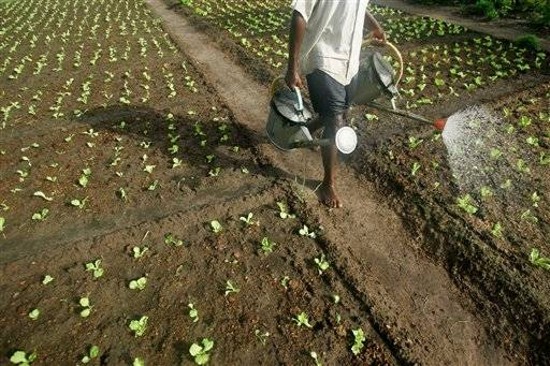
At the U.N. Summit held on World Environment Day yesterday, leaders across the world pledged to cut trade barriers and promote agricultural productivity to fight the food crisis spreading hunger and violent unrest across the world.
The summit was called by the U.N. Food and Agriculture Organization to talk about securing food supplies in the face of ascending demand, specially from rapidly developing Asian countries, poor harvests and rising fuel costs. These factors have facilitated a doubling of commodity prices over the past few years which the World Bank says has put 100 million people at risk of joining the already starving 850 million.
The Organization for Economic Cooperation and Development apprehends prices of rice, corn and wheat to recede but still up by 50 percent higher in the next decade. The FAO says food production must rise 50 percent by 2050 to meet the demand. Delegates from about 180 countries, following three days of intense debate, sanctioned a declaration resolving to alleviate the suffering caused by growing food prices and step up investment in agriculture.
The summit also struck a balance on the controversial issue of biofuels, acknowledging that there are both “challenges and opportunities” in using plant material for fuel and that “in-depth studies” are essential to secure that the environmental friendly energy source does not eliminate food for consumption. Brazil, the United States and other big producers of biofuels disagree on which crops are better-suited to produce the energy source and how much they facilitate raising food prices.
Strong objections were raised to certain parts of the declaration by some Latin American countries. Cuba was discomfited because the document did not censure the long-standing U.S. embargo against the Communist-ruled island. Argentina was displeased as it did not criticize farm subsidies in the U.S., European Union and other Western food-producers for a major role in raising prices.
The declaration called for swift aid for farmers in poor countries who need seed and fertilizers in time for the upcoming planting season.
Jacques Diouf, head of the Rome-based U.N. Food and Agriculture Organization, which hosted the summit said that although the summit was not a conference for pledging donations, billions of dollars from countries, regional banks and the World Bank had poured in in recent days. U.N. Secretary-General Ban Ki-moon had told the summit that measures like import taxes and export restrictions must be minimized to alleviate hunger and the document called for ‘reducing trade barriers and market-distorting policies.’
U.S. Agriculture Secretary Ed Schafer applauded the declaration on biofuels saying that the United States remains ‘firmly committed to the sustainable production and use of biofuels, both domestically and globally.’ Cuba’s delegation called the document ‘a step in the process to eradicate hunger,’ appreciating the declaration despite failing to articulate its criticism of the embargoes. The United States, a primary aid donor, opposes attempts to denounce its embargo on doing business with Cuba.
Some delegates ruminated the utility of the summit. Senegal President Abdoulaye Wade, a skeptic of international attempts to solve hunger and critic of the FAO, said it was a waste of time. Wade told Reuters,
There’s been a brutal rise in prices (of food) and we were told there was a threat hanging over the world and all the heads of state were called to attend. I thought it was going to be to answer the question about what should be done, but it wasn’t that at all.
Oxfam, the British-based poverty campaign group, however, was more upbeat, said Barbara Stocking, head of Oxfam GB,
It would be very easy to dismiss this food summit as a talking shop. But it could be a stepping stone to better policies and the money to implement them.
The summit has set apace more concrete talks on food and hunger in the coming months. Group of Eight leaders meet in Japan in the forthcoming month, by when a food crisis task force set up by U.N. Secretary-General Ban Ki-moon is scheduled to have issued a concrete action plan.
The summit’s talks on the potential benefits to poor farmers from new global trade rules will facilitate the conclusion of the so-called Doha round of World Trade Organization talks, which attain a potentially conclusive phase in the upcoming weeks.
Source: msnbc
Image: treehugger

